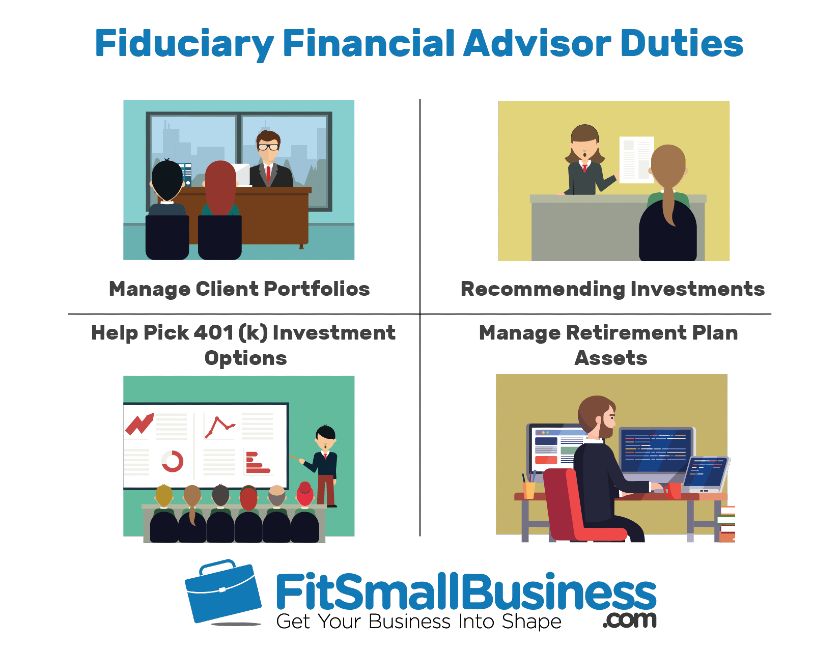A fiduciary financial advisor is an investment professional who is licensed with the United States Securities and Exchange Commission (SEC) or state regulators. Fiduciary advisors are important for clients because they are legally required to put clients’ interests ahead of their own. Using a fiduciary is important if you want an advisor to manage your money or make unbiased investment recommendations.
What Is a Fiduciary Financial Advisor?
A fiduciary financial advisor is required to represent clients objectively and sell clients products without regard for their compensation. Many services are the same for fiduciary vs. financial advisors including investment management and portfolio recommendations. There are two big differences in using a fiduciary advisor — compensation structure and legal requirements that advisors put your interests first.
Financial advisors who aren’t fiduciaries often receive commissions on the investments they sell. While nonfiduciaries must sell investments that are appropriate — or suitable — based on individual client circumstances, they are not required to put their clients’ interest first. A fiduciary advisor is important if you plan to give an advisor discretionary control of your account if you aren’t sure what you need and want sound, objective advice.
Fiduciary vs. Financial Advisors
The biggest difference between fiduciary vs. financial advisor is the standard they’re held to when advising clients. Most financial advisors have to sell investments that are suitable for clients, but fiduciaries must act with a higher standard of care. As a result, fiduciary advisors are often less expensive because client accounts aren’t charged commissions.
Some ways to distinguish a fiduciary vs. financial advisor include:
- Registration: If your financial advisor is registered with the SEC or state securities regulators, they are required to act as fiduciaries in at least some situations
- Series 7: A financial advisor who holds a FINRA Series 7 license doesn’t act as a fiduciary all the time — they may never be a fiduciary
- Series 65 or 66: Advisors who hold investment advisor licenses from Financial Industry Regulatory Authority (FINRA) are typically held to a fiduciary standard at least some of the time
- Certified financial planner (CFP): Whether a financial advisor is a CFP provides no indication whether they’re a fiduciary
- Trade associations: Membership in some trade association like the Investment Advisors Association (IAA) can indicate that a financial advisor acts as a fiduciary at least some of the time
Suitability Standard vs. Fiduciary Financial Advisors
When working with a typical financial advisor, the advisor is held to a standard of suitability. This standard requires that advisors understand their client’s circumstances and sell them investments that are appropriate. Fiduciary financial advisors, however, are held to a different standard. Under a fiduciary standard, advisors are legally required to put their clients’ interests first.
If you’re wondering which standard your advisor is held to, you can always ask them directly and have them provide an answer in writing. However, there are also some red flags that should indicate whether your advisor is a fiduciary vs. financial advisor.
Some red flags that your advisor doesn’t always act as a fiduciary include:
- Series 7 license: If a financial advisor has a Series 7 license they are allowed to collect commissions from the sale of investments, which means they don’t always act in a fiduciary capacity
- Series 63 or 66 license: A Series 63 or 66 is another license that a financial advisor needs to collect commissions, but if they collect commissions on product sales that means they don’t always act as fiduciaries
- Website Disclosures: Many financial advisory firms include disclosures including “securities offered through …” or “representatives licensed with …” that are red flags that these firms collect commissions from the sale of securities — meaning they don’t always act as fiduciaries
“While there are indicators, the only real way to tell whether an advisor is a fiduciary is to check their advisor agreement. It’s especially important to work with a fiduciary advisor if you’re giving discretionary control of your account to an advisor or if you aren’t familiar with the investment world and need help. There aren’t any situations where a client is better off working with someone who isn’t required to act in their best interest. Another good way to tell whether an advisor is a fiduciary is to check their SEC or state registration. If your advisor has a Form ADV on file, that’s a sign that they act as a fiduciary at least some of the time. If they also periodically in a nonfiduciary capacity, that will be disclosed in their ADV.”
— Patrick Cote, chartered financial analyst (CFA), CFP, Founding Partner, AssetGrade
Cote went on to say “Other red flags that someone doesn’t always act as a fiduciary include Series 7, 63, or 24 licenses. If your advisor is a member of the IAA, that typically indicates that they act as a fiduciary at least some of the time. However, there’s no one designation that a client can look at to know whether their advisor is a fiduciary — CFAs, CFPs or CPAs [certified public accountants] may or may not be fiduciaries.”
When to Use a Fiduciary Advisor
Clients are almost always better off using a fiduciary. In fact, there’s rarely a reason not to use a fiduciary. However, you may not need a fiduciary if you don’t want an advisor to manage your account on your behalf or even make recommendations. However, if you want an advisor to execute transactions or to buy insurance, there’s no need to use a fiduciary.
If you want a financial advisor who will manage your money for you, then it’s important for you to use a fiduciary advisor. Even if you just want to ensure that you get unbiased investment recommendations, then it’s a good idea to use a fiduciary vs. a financial advisor.
“In most cases, any SEC-registered investment advisor must serve as a fiduciary. To ensure this, it’s best if the advisory agreement specifically states the adviser accepts it will be held to the standard of a fiduciary under SEC/ERISA definitions. Any time you’re delegating investment advice to a third party (even if you will still ultimately make the decision to buy and sell securities based on that advice). In addition, especially in the case of employee retirement plans, hiring a professional fiduciary can reduce your own personal fiduciary liability.”
— Christopher Carosa, CTFA [certified trust and financial advisor], President, Carosa Stanton Asset Management
Types of Fiduciary Financial Advisor
Not all financial advisors are fiduciaries, but those that qualify as fiduciaries are required to act in their client’s best interest. All fiduciaries are held to this standard, even though different of fiduciary advisors do different things. Some manage money for clients while others help guide investment decisions or helping choose 401(k) investment options.
Some of the most popular types of fiduciary financial advisors include:
Discretionary Investment Advisor
Some fiduciary financial advisors assume discretionary control of clients’ investment accounts. These fiduciaries manage their clients’ assets on their behalf, executing trades when they deem necessary. These advisors typically collect investment management fees. They’re registered with the SEC or state regulators and required to act in clients’ best interest in their capacity in managing client portfolios.
The most common type of fiduciary financial advisor is a discretionary investment manager. These are advisors who have management agreements with individual clients and make investment decisions on their clients’ behalf. Advisors typically charge monthly or quarterly fees for this service which are either flat fees or based on the size of client accounts. Portfolio managers for mutual funds are also qualified fiduciaries.
Nondiscretionary Fiduciary Financial Advisor
There are some financial advisors who don’t have decision-making authority for client accounts but make recommendations for clients’ investments. If these advisors are registered as investment advisors with the SEC or various states, they are held to a fiduciary standard when making recommendations for clients.
A nondiscretionary fiduciary advisor is most commonly seen advising on employer employer-sponsored retirement plans like 401(k)s. These advisors help plan participants make decisions but don’t make investment decisions on their behalf. Nondiscretionary fiduciary advisors can also serve as financial managers who want to advise but not make financial decisions for clients.
Certified Financial Planner
A CFP is an advisor who has gone through additional training and gotten their designation from the Financial Planning Association. A CFP may or may not be as a fiduciary, depending on the licenses and registrations they hold. If they have a Series 7 license, that means they don’t always act as a fiduciary.
“When a financial advisor sells a product, the costs are buried in the product cost and not readily discernible by the client. Most fiduciaries are paid by engagement or on a monthly or quarterly retainer. With these forms of payment, the client agrees to either have fees deducted from an investment account or they choose to receive an invoice and write a check. The all-in costs to the client are no more when the client is aware of the fee when it’s deducted from an investment account or paid by the client than when the comp is buried in the investment contract.”
— Randy Brunson, AIF [accredited investment fiduciary], CEO, Centurion Advisory Group
A CFP acting as a fiduciary may serve in either a discretionary or nondiscretionary capacity. The CFP designation indicates that an advisor has undergone additional training in order to provide more comprehensive help to clients’ finances. These advisors are particularly helpful if you may also need insurance, annuities or other special products.
Retirement Plan Fiduciary Advisor
If you have a 401(k) at work, your employer is a fiduciary for your retirement plan. However, many employers hire a financial advisor to share in those responsibilities. There are two main types of retirement plan fiduciary advisors — those that help select 401(k) investment options those who make investment decisions for plan assets.
“If you’re looking for an advisor for a business, there are several different types of fiduciaries for retirement plans. The higher the level of fiduciary, the more responsibility the advisor takes on. However, plan sponsors never give up their fiduciary responsibility to the plan. One level of fiduciary to retirement plans involves the advisor helping to choose the fund lineup for a plan. Another level of fiduciary — the 3-38 fiduciary — is sometimes used by smaller companies to serve as an investment manager, making investment decisions directly and investing plan assets on behalf of the firm.”
— Susan Powers, CFA, CPA, CFP, Partner, AssetGrade
Most employer-sponsored retirement plans have an advisor who serves the plan. This is particularly important for businesses that have more than four or five employees. Business owners typically need help setting up a retirement plan and only get limited guidance from a plan administrator. These advisors are typically paid from plan assets.
Fiduciary Financial Advisors for Small Business Owners
In addition to advising on retirement plans, some fiduciary financial advisors can help small business owners in other ways. These include objective advice on succession planning and providing guidance on insurance products. So many different insurance products are available that it can be helpful to have a fiduciary provide objective advice based on specific needs.
Fiduciary advisors who work with small business owners serve as trusted advisors. Many act as financial managers for company owners who are focused on running their own businesses. Often, these services are part of a larger relationship such as a private banker or CPA. Fiduciaries who service small business owners usually have certain specialties like succession planning or financing solutions for business needs.
Fiduciary Financial Advisor Duties
There are many different kinds of fiduciary financial advisors, although they’re all held to the same fiduciary standard. Fiduciaries are required not only to provide investments that are suitable for the clients but also always put their clients’ interests first when managing money for a client or helping them make decisions.

Some fiduciary financial advisor duties may include:
- Managing money: Some fiduciaries manage money on their clients’ behalf
- Recommending investments: Clients may make their own investment decisions but get objective advice from a fiduciary
- 401(k) guidance: Fiduciary advisors can help choose investment options available to 401(k) plan participants
- Manage retirement plan assets: Some fiduciaries make investment decisions and manage money on behalf of a retirement plan
Financial Advisor Fees
Fiduciary financial advisor costs vary based on provider and the services they’re providing. Depending on the firm, fiduciaries may charge fees for managing client portfolios, subscription fees, hourly consulting fees or other costs. However, fiduciary advisors are typically less expensive than the costs clients pay through nonfiduciary advisors.
Fiduciary financial advisor fees may include:
- Advisory fees: 0.25% to 2.00% of account assets per year
The most common fee structure among fiduciary advisors is to charge a fixed percentage of the value of the account(s) they’re advising on. Fees can be up to 2 percent per year and are typically deducted from the account quarterly.
- Consulting fee: $20 to $200 per hour
Rather than charge account management fees, some fiduciaries charge flat hourly fees for helping to guide clients. Clients can then make their own investment decisions after getting objective advice from a fiduciary.
- Subscription fee: $0 to $5,000 per quarter
Some fiduciaries provide investment advice that clients can use to make their own investment decisions. Rather than billing per hour, they simply charge invoice clients each month or quarter in exchange for giving clients access to their advice.
- Retirement plan administration fee: 0.15% to 1.5% of plan assets per year
Fiduciary financial advisors who help guide employer-sponsored retirement plans typically charge an advisory fee that’s based on the number of assets in the plan.
Financial advisors charge different fees that vary in structure and in level. These fees depend in large part on the services an advisor is providing to clients. However, before you work with a financial advisor (fiduciary or not), it’s important to understand how an advisor is going to be paid.
“Not using a fiduciary advisor opens you up to paying a lot of extra fees, usually in the form of commissions. For example, if you are an investor with $100,000 to invest, a nonfiduciary advisor may allocate your investment into a fund that pays large commissions. It is not uncommon for nonfiduciary advisors to invest clients’ money in a fund that charges a front-end sales fees of 5 percent or more and expense ratios of 1 percent or higher. For an investor with $100,000 invested in a fund with a 5.75 percent front-end sales fee and a 1 percent annual expense ratio, they pay $5,750 in upfront sales fees (most of which are paid to the advisor as commissions), followed by $942 in the fund’s expense ratio (1 percent of $94,250).”
— Matt Hylland, President, Hylland Capital Management
Hylland went on to say that “a fiduciary advisor will invest you in a fund that has no upfront sales fees and has a much lower expense ratio. Even after accounting for their management fee, they can be significantly cheaper.”
How to Identify Fiduciary Financial Advisors
There are many ways to tell that a financial advisor isn’t a fiduciary. Fiduciary financial advisors have to be registered with the SEC or state regulators, but it can be hard to tell how an advisor is registered. Luckily, in addition to the SEC, there are other ways that you can tell with an advisor is a fiduciary.
Four ways to identify fiduciary financial advisors include:
- Search investment advisor public disclosure: Investment advisers registered with the SEC or states are all searchable in the SEC’s database. You can also see if advisors have broken rules or a firm’s Form ADV with fees and assets under management.
- Advisor website: Look for advisors who are “fee-only.” Fee-based advisors may act as fiduciaries, but the fiduciary standard always applies for fee-only advisors. Mention of commissions or the sale of securities also means an advisor isn’t a fiduciary.
- Just ask: One of the best ways to find out if a financial advisor is a fiduciary is to ask them directly. When you ask about their fee structure or whether they act as a fiduciary financial advisor, it can be a good idea to get answers in writing.
- Search directories: Another way that you can try to find financial advisors is to search directories for trade associations. The IAA, for example, has many members that serve as fiduciary financial advisors.
“Whether an advisor is acting as a fiduciary or has fiduciary obligations can be very difficult for the layperson to determine. Because duties apply to different advisors depending how they are regulated or even by their title or other designation, perhaps the best way to identify whether an advisor has fiduciary obligations is to ask the financial advisor. Those who hold themselves out as a fiduciary should be able to clearly articulate how they are prepared to act in accordance with their fiduciary obligations and to describe the impact their actions or requirements have or will have on their clients.”
— Kathleen A. Stewart, JD AIF, Senior Director, Family Wealth Strategist, BNY Mellon Wealth Management
If you want to work with a fiduciary financial advisor, you should also make sure that they have adequate insurance. This includes fiduciary liability insurance, which helps protect you if your advisor makes a mistake when administering your account or managing your assets.
5 Top Fiduciary Financial Advisors
Many fiduciary financial advisors are smaller, lesser-known firms. However, there are also some large firms that operate as fee-only fiduciary advisors or who serve as fiduciaries in some roles but not in others. It’s critical for clients to inquire whether their advisor will act as a fiduciary or be collecting commissions or other compensation on investments.
Five of the best-known of firms that offer fiduciary financial advisor services are:
1. Fidelity
Fidelity offers a number of banking, brokerage, and advisory services. While Fidelity representatives don’t always act as fiduciary financial advisors, they do have some advisors who can act as fiduciaries. However, investors need to be cautious of what services they’re buying and make sure that their advisor will act as a fiduciary and their account won’t be charged commissions.
2. BNY Mellon
BNY Mellon Wealth Management is part of an extremely large and storied financial institution that has a dedicated fiduciary services unit. Not all reps within the wealth management department are fiduciary advisors, but clients of the fiduciary services unit can rest assured that they have a fiduciary financial advisor watching over their account.
3. Fisher Investments
Fisher Investments is one of the world’s largest fee-only advisor and manages about $100 billion. Financial advisors with Fisher Investments always act as fiduciary financial advisors because of how the firm is structured, so the firm is ideal for clients who don’t want to worry about whether their advisor will act as a fiduciary.
4. Vanguard
Vanguard is the largest mutual fund company in the world. As a very large and well-established company, Vanguard focuses on providing management services to dozens of mutual funds and exchange-traded funds (ETFs). The company also offers fiduciary services to select clients, which is a great option for individuals who want to focus on cost-efficient passive investing.
5. Charles Schwab
Charles Schwab is a huge diversified financial services company. The firm offers retail banking, brokerage and investment advisory services including in a fiduciary capacity. Schwab is ideal for clients who want a partner to help grow their business with products like checking accounts and business loans in addition to offices all over the country.
Fiduciary Financial Advisors Frequently Asked Questions (FAQs)
If you still have questions about fiduciary financial advisors, here are some of the most frequently asked questions about fiduciary advisors.
What Is the Fiduciary Rule?
Registered investment advisors are held to a fiduciary standard when advising client accounts. This fiduciary standard requires fiduciary financial advisors to put their clients’ interests first. The fiduciary rule was also a rule proposed by the U.S. Department of Labor to limit advisor compensation from retirement accounts, but the rule’s no longer being enacted.
How Do Financial Advisors Make Money from Mutual Funds?
Nonfiduciary advisors are paid commissions when they sell shares in mutual funds. Advisors can also share in 12b-1 fees that are paid annually by most mutual funds. Fiduciary financial advisors can’t collect commissions or other compensation directly from mutual funds but are limited to independent management or advisory fees that they charge to clients.
Is a Trustee a Fiduciary?
A trustee is a person or entity that holds legal title to a property. In a trust, a trustee has certain duties to perform on behalf of the trust’s beneficiaries. However, a trustee is not a fiduciary. A fiduciary is a person or firm that is legally required to exercise reasonable care in managing a client’s assets.
Can You Sue a Fiduciary Advisor?
If you’ve suffered losses as a result of fraud or negligence by a financial advisor, you may have grounds for filing a lawsuit against a financial advisor. If you can prove that your advisor was fraudulent or negligent in their guidance or management of your account, you may be able to claim your losses as damages.
The Bottom Line
Fiduciary financial advisors are investment professionals registered with the SEC or state securities regulators. Fiduciary advisors can’t collect commissions from selling investments and must put their clients’ interests first. If you aren’t sure what investments you need or want an advisor to manage your account, make sure your financial advisor is held to a fiduciary standard.
 “While there are indicators, the only real way to tell whether an advisor is a fiduciary is to check their advisor agreement. It’s especially important to work with a fiduciary advisor if you’re giving discretionary control of your account to an advisor or if you aren’t familiar with the investment world and need help. There aren’t any situations where a client is better off working with someone who isn’t required to act in their best interest. Another good way to tell whether an advisor is a fiduciary is to check their SEC or state registration. If your advisor has a Form ADV on file, that’s a sign that they act as a fiduciary at least some of the time. If they also periodically in a nonfiduciary capacity, that will be disclosed in their ADV.”
“While there are indicators, the only real way to tell whether an advisor is a fiduciary is to check their advisor agreement. It’s especially important to work with a fiduciary advisor if you’re giving discretionary control of your account to an advisor or if you aren’t familiar with the investment world and need help. There aren’t any situations where a client is better off working with someone who isn’t required to act in their best interest. Another good way to tell whether an advisor is a fiduciary is to check their SEC or state registration. If your advisor has a Form ADV on file, that’s a sign that they act as a fiduciary at least some of the time. If they also periodically in a nonfiduciary capacity, that will be disclosed in their ADV.” “In most cases, any SEC-registered investment advisor must serve as a fiduciary. To ensure this, it’s best if the advisory agreement specifically states the adviser accepts it will be held to the standard of a fiduciary under SEC/ERISA definitions. Any time you’re delegating investment advice to a third party (even if you will still ultimately make the decision to buy and sell securities based on that advice). In addition, especially in the case of employee retirement plans, hiring a professional fiduciary can reduce your own personal fiduciary liability.”
“In most cases, any SEC-registered investment advisor must serve as a fiduciary. To ensure this, it’s best if the advisory agreement specifically states the adviser accepts it will be held to the standard of a fiduciary under SEC/ERISA definitions. Any time you’re delegating investment advice to a third party (even if you will still ultimately make the decision to buy and sell securities based on that advice). In addition, especially in the case of employee retirement plans, hiring a professional fiduciary can reduce your own personal fiduciary liability.” “When a financial advisor sells a product, the costs are buried in the product cost and not readily discernible by the client. Most fiduciaries are paid by engagement or on a monthly or quarterly retainer. With these forms of payment, the client agrees to either have fees deducted from an investment account or they choose to receive an invoice and write a check. The all-in costs to the client are no more when the client is aware of the fee when it’s deducted from an investment account or paid by the client than when the comp is buried in the investment contract.”
“When a financial advisor sells a product, the costs are buried in the product cost and not readily discernible by the client. Most fiduciaries are paid by engagement or on a monthly or quarterly retainer. With these forms of payment, the client agrees to either have fees deducted from an investment account or they choose to receive an invoice and write a check. The all-in costs to the client are no more when the client is aware of the fee when it’s deducted from an investment account or paid by the client than when the comp is buried in the investment contract.” “If you’re looking for an advisor for a business, there are several different types of fiduciaries for retirement plans. The higher the level of fiduciary, the more responsibility the advisor takes on. However, plan sponsors never give up their fiduciary responsibility to the plan. One level of fiduciary to retirement plans involves the advisor helping to choose the fund lineup for a plan. Another level of fiduciary — the 3-38 fiduciary — is sometimes used by smaller companies to serve as an investment manager, making investment decisions directly and investing plan assets on behalf of the firm.”
“If you’re looking for an advisor for a business, there are several different types of fiduciaries for retirement plans. The higher the level of fiduciary, the more responsibility the advisor takes on. However, plan sponsors never give up their fiduciary responsibility to the plan. One level of fiduciary to retirement plans involves the advisor helping to choose the fund lineup for a plan. Another level of fiduciary — the 3-38 fiduciary — is sometimes used by smaller companies to serve as an investment manager, making investment decisions directly and investing plan assets on behalf of the firm.” “Not using a fiduciary advisor opens you up to paying a lot of extra fees, usually in the form of commissions. For example, if you are an investor with $100,000 to invest, a nonfiduciary advisor may allocate your investment into a fund that pays large commissions. It is not uncommon for nonfiduciary advisors to invest clients’ money in a fund that charges a front-end sales fees of 5 percent or more and expense ratios of 1 percent or higher. For an investor with $100,000 invested in a fund with a 5.75 percent front-end sales fee and a 1 percent annual expense ratio, they pay $5,750 in upfront sales fees (most of which are paid to the advisor as commissions), followed by $942 in the fund’s expense ratio (1 percent of $94,250).”
“Not using a fiduciary advisor opens you up to paying a lot of extra fees, usually in the form of commissions. For example, if you are an investor with $100,000 to invest, a nonfiduciary advisor may allocate your investment into a fund that pays large commissions. It is not uncommon for nonfiduciary advisors to invest clients’ money in a fund that charges a front-end sales fees of 5 percent or more and expense ratios of 1 percent or higher. For an investor with $100,000 invested in a fund with a 5.75 percent front-end sales fee and a 1 percent annual expense ratio, they pay $5,750 in upfront sales fees (most of which are paid to the advisor as commissions), followed by $942 in the fund’s expense ratio (1 percent of $94,250).” “Whether an advisor is acting as a fiduciary or has fiduciary obligations can be very difficult for the layperson to determine. Because duties apply to different advisors depending how they are regulated or even by their title or other designation, perhaps the best way to identify whether an advisor has fiduciary obligations is to ask the financial advisor. Those who hold themselves out as a fiduciary should be able to clearly articulate how they are prepared to act in accordance with their fiduciary obligations and to describe the impact their actions or requirements have or will have on their clients.”
“Whether an advisor is acting as a fiduciary or has fiduciary obligations can be very difficult for the layperson to determine. Because duties apply to different advisors depending how they are regulated or even by their title or other designation, perhaps the best way to identify whether an advisor has fiduciary obligations is to ask the financial advisor. Those who hold themselves out as a fiduciary should be able to clearly articulate how they are prepared to act in accordance with their fiduciary obligations and to describe the impact their actions or requirements have or will have on their clients.”